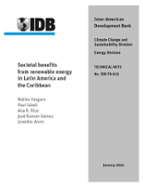Societal Benefits from Renewable Energy in Latin America and the Caribbean
Date
Jan 2014
Population growth and advances in quality of life in Latin America and the Caribbean (LAC) will require the region to rapidly increase its energy supply, even if major improvements in energy efficiency are attained. The region is characterized by a low-carbon power matrix and a potential to produce over 78 PWh from non-traditional renewable energy technologies (NRETs). However, bias toward fossil fuels and the perceived cost disadvantages prevent further market entry of renewable energy. Additional (societal) benefits of employing renewables are considerable but typically left out of cost comparisons. A consideration of these benefits may offer a rationale to promote investment and support regulations that would contribute to the deployment of these NRET technologies. We quantify societal benefits in terms of avoided costs (climate change avoided costs, avoided pollution control costs, avoided energy security costs) and economic benefits (improvements in the balance of payments and job creation). Results indicate that societal benefits are sufficiently large enough to compensate the cost disadvantage of solar and wind energy against fossil alternatives, justifying the eventual wholesale entry of these options.



